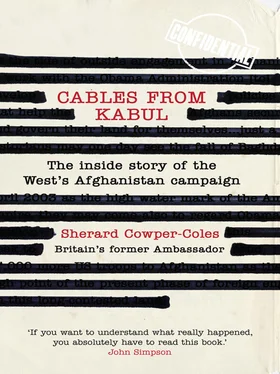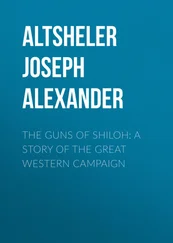Little of that was obvious to me as we got to know each other over dinner and drinks on the vast terrace of the Ambassadorial apartment. As we looked over the parapet through the dust-filled night at the uncertain flickering of Kabul’s lights, Bill revealed what was on his mind. He spoke of bringing over US Drug Enforcement Administration crop duster aircraft and helicopter gunships, and spraying the whole of the Helmand Valley with the weedkiller Roundup. C-130 transport aircraft could fly behind, dropping seed and shovels to the population. If it were done soon enough, there would be time for a second harvest in 2007.
As mildly as I dared at this first encounter with a key contact, I expressed doubts about whether this approach was practical. I wondered whether other green crops might be killed too. I asked what President Karzai and his Government (who were known to be strongly opposed to aerial spraying) would think, and how a population deprived overnight of much of their livelihood would react. I worried that such action might risk turning an insurgency into an insurrection. But Bill stuck to his guns. Aerial spraying had worked in Colombia. With British support, it could be made to work in Helmand. Bill would put US thinking down on paper and send it to me. He looked to me to swing HMG behind such an approach. I promised to think about it.
When I woke the next morning, I wondered if I had been dreaming. Or if Bill had been exaggerating for effect. But I realised how serious he was, and what difficulties we would face with the Bush Administration over poppy eradication, when an email from Bill popped into my home inbox, covering a one-page Word document in which was set down, in black and white, the US drug-eradication plan for Helmand.
Other first encounters were more straightforward. A week or so after arriving I was summoned to the old Palace in the centre of Kabul to present my credentials to President Karzai. Over the next three years I was to come to know well that Palace, in which so much of Afghanistan’s bloody recent history had been played out. But for now my mind was on making a good impression on the man who was key to our whole strategy. I had met him only once before, at an economic conference in Jeddah. Like most of Hamid Karzai’s foreign interlocutors encountering him for the first time, I had been immediately taken by his easy charm and obvious charisma, enhanced by perfect English and the stylish combination of Persian lamb cap and green and silver striped Afghan cloak.
As I was led by the Chief of Protocol through the dark hall and up the great stairs of the Arg Palace, I knew I was passing the spot where President Daoud and many other members of the royal family, including a dozen women and young children, had been gunned down in the Communist coup of April 1978. After a short delay, President Karzai came bustling in from a door in the corner of the audience chamber on the first floor. With my Deputy and Defence Attaché beside me, I marched up to the President, bowed and spluttered out a speech in broken Pashtu, which I had learned by heart. Karzai broke into a broad grin. The Ministers and courtiers ranged on the sofas at either side giggled. But I had made my point: my appointment signalled a step change in the relationship, and an effort by Britain to give Afghanistan in general, and President Karzai in particular, the political support and attention they deserved, given the scale of our military commitment.
We then retired immediately to the President’s study just off the audience chamber. In a ritual we were to repeat scores of times over the next three years, Karzai took his seat in the chair on the right side of the fireplace, with his team ranged on the sofa to his left. I took mine in the chair to the left, with my team ranged on the sofa to my right, stretching back to the door. On the table between us were placed tea and coffee and cakes. I conveyed greetings from the Queen and from the Prime Minister (still Tony Blair). Karzai launched into rhapsodies about our royal family, about Blair and about a somewhat idealised vision of the British way of life. I spoke of my determination to work with the President, and to give him and his Ministers the support they needed. I handed over the toy wooden railway I had brought out for Karzai’s adored and long-awaited son, Mirwais.
All this sweetness and light was clouded by only one subject: narrowing his eyes, the President asked me what I thought of Pakistan. I confessed that, apart from my airport stopover, I had never been there and had no particular personal views. Karzai did not look convinced, but we moved on to other subjects. Here was a hint of trouble ahead.
In the days that followed, I paid my respects to all the other big players in Kabul. First and foremost was the Commanding General of ISAF, General Dan McNeill. A veteran of the fabled United States 82nd Airborne Division, Dan had served twice before in Afghanistan, and was proud never to have had a home tour north of the Mason–Dixon Line. He was a much wiser and more accomplished operator than those who criticised him from afar as too ‘kinetic’ ever really understood. His quiet, kindly manner concealed a depth of understanding and judgement we failed properly to appreciate or exploit.
Quite different from General McNeill was the Special Representative of the UN Secretary General, Tom Königs. As head of the UN Assistance Mission in Afghanistan (UNAMA), Königs was nominally in charge of all UN operations in Afghanistan, with well over a dozen different agencies represented. This was in theory only, however, as different baronies competed for turf and resources. Königs wasn’t helped by his character or background: a gentle German public servant, with distinctly Greenish sympathies, he was said to have given most of his family fortune to the Sandinistas, the left-wing political party in Nicaragua. Following successful tours with the UN in the Balkans and elsewhere, he had been chosen to wind down the UN political presence in Afghanistan, in the belief, prevalent in 2005, that the mission was all but accomplished. Instead, he found himself facing a steadily worsening security and political situation, although still far less serious than that which confronted his successors. Königs’s Deputy was the able Canadian diplomat Chris Alexander, whom I had met at Wilton Park; he was a formidable operator, who never let much check his unquenchable optimism.
The veteran European Union Special Representative in Kabul, Francesc Vendrell, had an even longer Afghan pedigree, having served variously as UN and EU representative for Afghan affairs since January 2000. Vendrell, who is Spanish by birth but British by upbringing, had forgotten more about Afghanistan than most of us would ever know. His family had sent him to England as a boy out of distaste for General Franco. He had ended up reading law at Cambridge and being called to the English Bar, before pursuing a long career as a UN diplomat. His wise understanding of the realities of Afghanistan was a refreshing contrast to the Panglossian pieties mouthed by others in the international community. Vendrell became a real soulmate. His one weakness was a passion for trams (or, more delicately, ‘light rail’), to which most of his vacations seemed to be devoted. Sadly, his tram-spotting tendency was contagious, as I was to discover.
Vendrell’s sceptical view of the Bush Administration’s ‘strategy’ for Afghanistan was informed by the expertise he had built up in his office, starting with his remarkable Deputy, Michael Semple, a genial Irishman with twinkling eyes and a straggling beard, who spoke both Dari and Pashtu. Semple had an unrivalled understanding of the situation in the tribal areas on both sides of the Durand Line which separated Afghanistan from Pakistan. His eventual undoing was the fact that he knew too much about Afghanistan, even to the extent of dressing as an Afghan.
Читать дальше












